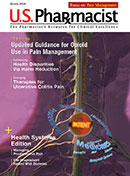Untreated or inadequately treated depression is well known for its disabling impact on patients. According to a new study, the association between control over depressive symptoms translates to fewer hyperglycemic-crisis episodes, including diabetic ketoacidosis, which can be life-threatening if untreated. Research published in Diabetes Research and Clinical Practice highlights the importance of appropriate treatment for depression to avoid suboptimal management of diabetes.
Yu-Chih Shen, MD, PhD, director of the Department of Psychiatry, Hualien Tzu Chi Hospital, Buddhist Tzu Chi Medical Foundation, and associate professor in the Department of Human Development at Tzu-Chi University School of Medicine in Taiwan, and colleagues explored the potential relationship between the duration of antidepressant use and the risk of hyperglycemic-crisis episodes in diabetic patients with depression.
The team compared 26,746 diabetic patients diagnosed with comorbid depression with 106,853 controls without depression who were matched by age, gender, and Charlson Comorbidity Index (CCI) score. Data on the number of hyperglycemic-crisis episodes and diagnoses of diabetes and depressive disorder in these two cohorts were obtained from the National Health Insurance Research Database of Taiwan for the years 1999–2013. Cox regression analysis was employed to calculate hazard ratio (HR) with 95% confidence interval (CI) of the hyperglycemic-crisis episodes incidence rate between the two cohorts.
The researchers reported that diabetic patients with depression were at significantly higher risk for hyperglycemic-crisis episodes (2.87 vs. 2.50 per 1,000 person-years, HR 1.78; 95% CI 1.56-2.03). Upon further examination, the team also concluded that long-term use of antidepressants in depressed diabetic patients conferred a significantly reduced risk of hyperglycemic-crisis episodes compared with patients not taking antidepressants (HR 0.44; 95% CI 0.35-0.55).
In a recent interview, Dr. Shen commented, “Hyperglycemic crisis episode includes diabetic ketoacidosis and hyperosmolar hyperglycemic syndrome, both of which can be life-threatening if left untreated.” Dr. Shen and colleagues wrote, “Even after hyperglycemic crisis episode, an even higher mortality risk observed during the follow-up period underscores the importance of preventing hyperglycemic crisis episodes to improve outcomes for patients.”
The researchers gave their interpretation of these findings: “First, the symptoms of depression created problems that prevented the self-management of diabetes, second, multiple somatic complaints are often observed in patients with depression, which may lead physicians to be considered psychosomatic and forget the possibility of warning signs of poor glycemic control and third, there may be a lack of continuity in diabetes care, as physical and mental illnesses are often treated separately, and geographical, administrative and resource separation creates ambiguity about the responsibility for the physical health of these patients.”
In addition to a longer duration of antidepressant use translating to a reduced risk of hyperglycemic-crisis episodes, the team found, diabetic patients diagnosed with depressive disorder are also predisposed to develop potentially life-threatening hyperglycemic-crisis episodes.
« Click here to return to Diabetes Update.
Published February 13, 2020






